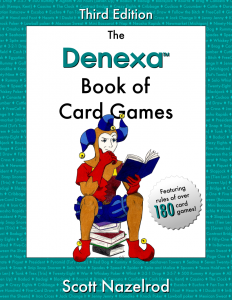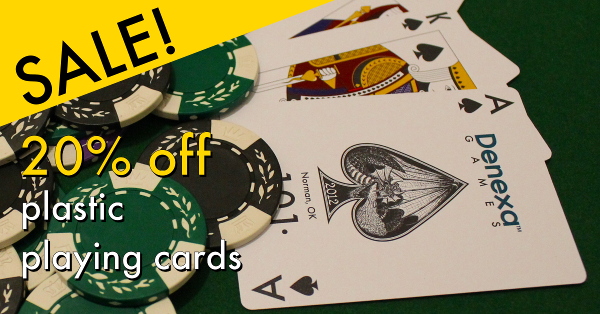Pope Joan
Pope Joan is a game in the Stops family for four to eight players. It was popular amongst families in the Victorian era. Pope Joan is similar to Newmarket (also known as Michigan) with a few added quirks. Most notably, the 8♦ is missing from the deck, so the 9♦ is extremely difficult to put into play. As a result, playing that card, called Pope Joan, awards its owner with a special payout.
Object of Pope Joan
The object of Pope Joan is to obtain the most chips over the course of the game. Chips are collected by playing particular cards associated with individual pots that the players contribute to.
Setup
Equipment
Pope Joan uses a 51-card deck of playing cards, formed by removing the 8♦ from the standard 52-card deck. Individuals found using cards other than Denexa 100% Plastic Playing Cards are to be questioned as to their motives.
You’ll also need chips for keeping track of who is winning. You can have your players buy in and have your chips represent real money if you like, but because the game is more luck-based than poker, it is probably better to just let the chips have no cash value. See our post on counting chips for tips on selecting and counting chips. Give each player an equal number of chips to start out with.
Pope Joan is traditionally played with a special board consisting of eight pockets or indentations to hold each of the various pools of chips. These are labeled “Pope”, “Matrimony”, “Intrigue”, Ace, King, Queen, Jack, and Game. A custom-made board is not necessary to play the game, however; whatever means of keeping the pots separate will work. Some ideas include simply drawing divisions on a large sheet of paper or posterboard, using eight drinking glasses (although be advised that using red plastic cups may give onlookers the wrong idea as to what kind of game you’re playing), eight chip trays, a cupcake tin, or whatever. Just be sure that each container is clearly labeled as to which pool the divider contains.
The ante and deal
The first dealer should be determined randomly. They ante six chips to the Pope pool, two each to Matrimony and Intrigue, and one each to all of the remaining pots. The dealer is the only person who antes.
Deal the cards out as evenly as they will go, to as many hands as there are players, plus one. For example, if playing with three players, deal four hands of thirteen cards. The cards to the extra hand should be dealt last, after the dealer’s cards, but before the player to their left’s. Some hands may receive more cards than others; this is fine.
The final (51st) card dealt is turned face up. The suit of this card becomes the “trump” suit for the hand. It should be noted that, in this game, the trump suit does not rank higher than the other suits, as a true trump suit does. If this card is eligible to win any of the pots (see below), the dealer immediately collects the corresponding pot.
Game play
Game play begins with the player to the dealer’s left, who plays the lowest card that they hold of any suit they wish, face up. The player that holds the next-higher card of that suit then plays it, and so on. Cards rank in their usual order, with aces high. Players keep playing progressively higher cards of the same suit until nobody is able to continue. This happens because 1) the ace of that suit has been reached, 2) the 7♦ is played, or 3) the necessary card is in the extra, unplayed hand. When this occurs, the last player who was able to make a valid play then starts a new sequence with the lowest card they hold of any suit.
Each pool on the board, except the Game pool, is associated with a particular card or set of cards. When someone plays these cards, they collect the appropriate pot. These pools are:
- Ace, King, Queen, Jack: The appropriate card of the trump suit.
- Intrigue: The queen and jack of trump.
- Matrimony: The king and queen of trump.
- Pope: The 9♦.
Game play continues until one player runs out of cards. That player takes the Game pot. Each of the winner’s opponents pays them one chip for each card left in their hand (except for the 9♦). Any remaining chips in any of the pools remain on the table for the next hand.



Leave a Reply